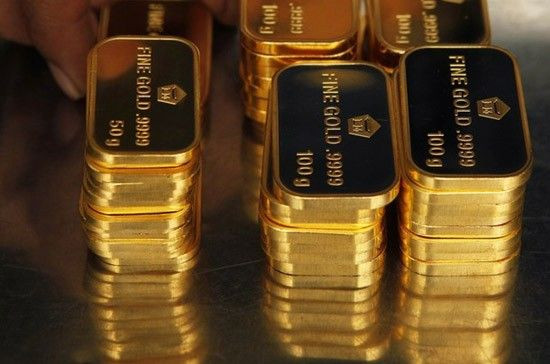Euro Zone Breakup Expected To Jack Up Gold Prices: Report

The exit of one or more countries from the euro zone could drive gold prices significantly higher, according to a Friday Capital Economics report.
Rising uncertainty and a loss of faith in the ability of European Union leaders to contain the escalating euro crisis will drive demand for gold as a safe haven, jacking up prices to $2,000 per ounce before the end of this year in the face of renewed fears of a euro zone breakup, the report stated.
Gold has put up a mediocre performance this year. Prices rose by about 2 percent in dollar terms and 8 percent in euro currency. Gold could have fared better if demand from India hadn't been weakened by tax increases and a fall in the value of the rupee. However, gold prices are rebounding even as investors around the world gain more confidence in the strength of the U.S. dollar against other currencies.
In the event of a euro zone breakup, gold will outbid the U.S. dollar, even if it remains one of the strongest currencies, Julian Jessop, chief global economist at Capital Economics, predicted in the report.
History, Jessop explained, is the strongest predictor of an impending rise in gold prices. Although the value of the dollar rose by 7 percent against other currencies, dollar prices of gold jumped more than 10 percent in the first five months of 2010, when markets first began to wake up to debt problems brewing in Greece.
In the lead-up to the financial meltdown in 2008, investors sought refuge in the safety of gold and its features as a hedge against currency risks. Gold prices rose 140 percent between August 2007 and early September 2011, weeks before Lehman Brothers collapsed. Bullish investors stampeded the market for gold when prices tumbled in the wake of the Lehman Brothers crash in September.
"It's a safe-haven demand in the event of uncertainty," Jessop said in an interview from London. "Uncertainty will drive demand for safe havens, and gold is one of the obvious ones. And the move (in gold prices) has been consistent with the trend we've seen over the past few years."
The report comes after European Union (EU) leaders headed to Greece this week to review the country's progress on implementation of austerity measures and structural reforms. The Greek government, broadly a mishmash of Conservatives and Socialists, stumbled through meetings with its grim international creditors, struggling to clinch a deal involving an €11.5 billion ($14 billion) package of budget cuts.
Greece's exit from the euro zone is almost certain now. That's the consensus among many quarters including the Finance Ministry in Germany. Officials from the troika -- the European Commission, the International Monetary Fund and the European Central Bank -- privately doubt the country will be able to meet its official target of reducing its massive debts to 120 percent of national GDP by 2020. Many experts say that this target was never within reach.
For now, global markets are hovering around a belief that the crisis in Europe can be alleviated by restructuring the messy debts of embattled euro zone nations. However, the exit of one or more countries will take the crisis to a whole new level, Jessop noted. His working assumption is that Greece will pull out first, followed by Ireland and Portugal.
Gold prices on the COMEX are currently $1,605.7 per ounce.
© Copyright IBTimes 2025. All rights reserved.





















